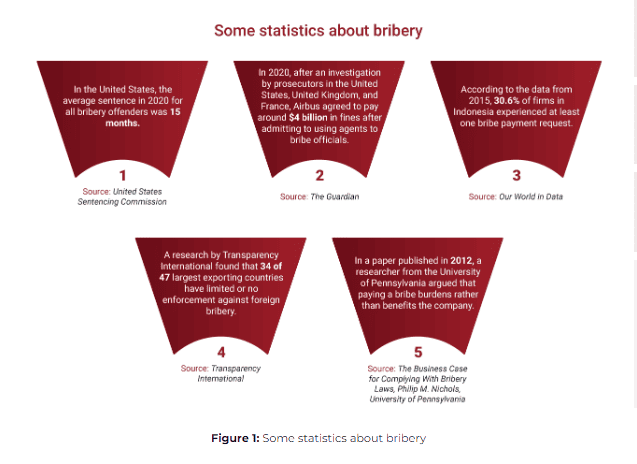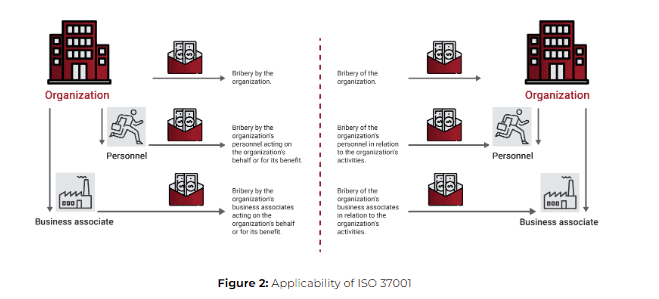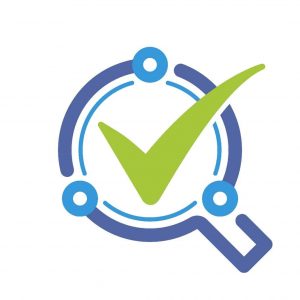ISO 37001 Anti-Bribery Management System – Training Courses
It is estimated that globally, over $1.5 trillion in bribes changes hands every year. Apart from the negative economic impact, bribery also impacts the whole society as it undermines trust, leads to unfairness, creates inequality, and stifles motivation. ISO joined the global fight against bribery by developing ISO 37001, an international standard that sets out the requirements for an anti-bribery management system (ABMS).

What is ISO 37001?
Published in 2016 as a Type A management system standard (MSS), ISO 37001 specifies the requirements and provides guidance for the establishment, implementation, monitoring, maintenance, and continual improvement of an ABMS.
An ABMS based on ISO 37001 is intended to help organizations effectively prevent, detect, and respond to bribery. Other forms of corruption, such as fraud, are not covered by the standard. The requirements of the standard are generic and applicable to all organizations, regardless of their type, size, and sector (public, private, or not-for-profit). Furthermore, ISO 37001 can be used to tackle bribery by or of the organization as well as direct and indirect bribery.

ISO 37001 follows the High-Level Structure (HLS) and shares the common terminology with other management system standards developed by ISO. This means that an ABMS can either be established as a stand-alone management system, be part of an overall compliance management system based on ISO 37301, or be integrated with other management systems based on standards such as ISO 37002, ISO 9001, and ISO 45001.
ISO 37001 benefits to organizations
Implementing an ABMS based on ISO 37001 can be a good strategic decision to demonstrate an organization’s commitment to effectively prevent, detect, and respond to bribery. Organizations seeking an effective ABMS will have to demonstrate their commitment to prevent bribery by establishing policies, procedures, and controls which contribute in reducing bribery risks. Nevertheless, the requirements of ISO 37001 are generic; therefore, organizations will have plenty of freedom to establish an ABMS which best suits their needs.
Some of the benefits that organizations would obtain by implementing an ABMS based on ISO 37001 include:
- Improved ability to detect, prevent, and respond to bribery by or of the organization
- Opportunity to certify the ABMS by undergoing a conformity assessment from an accredited conformity assessment body
- Establishment of processes that allow proper due diligence of prospective personnel and business associates
- Opportunity to contribute in the global fight against bribery
- Opportunity to shape, improve, or transform the culture of an organization
- Improved ability to respond, mitigate, and deal with the consequences if a bribery case occurs
- In certain jurisdictions, the existence of an internal mechanism to address bribery issues can reduce penalties in cases of wrongdoing
Why should you attend one of our ISO 37001 training courses?
As a global provider of training, examination, and certification services, PECB will help you become a successful anti-bribery consultant, auditor, or implementation/auditing team member.
- ISO 37001 Introduction training course is appropriate for professionals who want to obtain a brief and overall understanding of ISO 37001 requirements for an ABMS
- ISO 37001 Foundation training course is appropriate for entry-level professionals who want to acquire a clause-by-clause overview of ISO 37001 requirements for an ABMS.
- ISO 37001 Lead Implementer is a five-day training course that will enable you to acquire the necessary competencies to implement, operate, maintain, and continually improve an ABMS based on ISO 37001.
- ISO 37001 Lead Auditor is a five-day training course that allows you to obtain the necessary capabilities to audit an ABMS against the criteria established by ISO 37001, based on the good practices and guidelines and requirements for auditing management systems outlined by ISO 19011 and ISO/IEC 17021-1.
Join the global fight against bribery!
Why choose PECB?
Internationally recognized, PECB certifications represent peer recognition and demonstrate your professional capabilities. Our ISO 37001 Lead Auditor and ISO 37001 Lead Implementer certificates are accredited by IAS. The IAS Accreditation Mark provides additional value to the certificate and allows you to capitalize on the worldwide recognition that IAS holds.
How do I get started with ISO 37001 Training?
Contact us to start with the first step!
PECB Certified ISO 37001 training courses available
Why should you attend?
ISO 37001 Introduction is a one-day training course which introduces you to the basic concepts and principles of anti-bribery management and provides an overview of the ISO 37001 requirements for an anti-bribery management system (ABMS). In this training course you will be acquainted with the requirements set out in clauses 4 to 10, along with explanations on the intent of each clause. In addition, the training course showcases the connection between ISO 37001 and other standards.
Who should attend?
The ISO 37001 Introduction training course is intended for:
- Managers, consultants, and compliance officers wishing to get introduced to the ISO 37001 requirements for an ABMS
- Personnel responsible for maintaining conformity to the ISO 37001 requirements in an organization
- Personnel responsible for maintaining and improving ethical conduct
- Members of AMBS implementation project teams
- Individuals aspiring to pursue a career in anti-bribery management
Learning objectives
By the end of this training course, the participant will be able to:
- Understand the main concepts of an anti-bribery management system (ABMS) and its processes based on ISO 37001
- Understand the basic elements of an ABMS based on the requirements of ISO 37001
Educational approach
The training course is participant centered and contains:
- Essay-type exercises and multiple-choice quizzes
- Interactions between participants by means of questions and suggestions
Prerequisites
There are no prerequisites to participate in this training course.
Course Agenda
This one-day training course is comprised of the following sections:
Section 1: Training course objectives and structure
Section 2: Standards and regulatory frameworks
Section 3: Fundamental concepts and principles of anti-bribery management
Section 4: An overview of ISO 37001 requirements — Clauses 4 to 10
Section 5: Closing of the training course
General Information
- Training material of over 100 pages of information and practical examples will be provided.
- An attestation of course completion worth 7 CPD (Continuing Professional Development) credits will be issued to participants who have attended the training course.
Why should you attend?
This training course is designed to help participants understand the fundamental concepts and principles of an anti-bribery management system (ABMS) based on ISO 37001. By attending this training course, participants will learn more about the structure and requirements of the standard for an ABMS, including the anti-bribery policy, the top management’s leadership and commitment, processes related to specific controls such as due diligence, financial and non-financial controls, gifts, hospitality, and donations, as well as performance evaluation and continual improvement processes.
After completing this training course, you can sit for the exam and, if you successfully pass it, you can apply for the “PECB Certificate Holder in ISO 37001 Foundation” designation. A PECB foundation certificate proves that you have knowledge on the fundamental concepts, principles, methodologies, requirements, framework, and management approaches used in establishing anti-bribery management systems.
Who should attend?
- Managers and consultants seeking to know more about anti-bribery management
- Professionals wishing to get acquainted with ISO 37001 requirements for an ABMS
- Individuals engaged in or responsible for anti-bribery management activities in their organization
- Individuals wishing to pursue a career in anti-bribery management
Learning objectives
Upon successful completion of this training course, the participants will be able to:
- Describe the anti-bribery management concepts, principles, and definitions
- Explain the main ISO 37001 requirements for an anti-bribery management system
- Identify potential actions and approaches that organizations can use to achieve conformity to ISO 37001
Educational approach
- Lecture sessions include discussion questions and examples.
- The exercises include multiple-choice quizzes.
- The participants are encouraged to intercommunicate and engage in discussion and the completion of quizzes.
- Quizzes are similar to the exam.
Prerequisites
None
Course Agenda
Day 1: Introduction to anti-bribery management system (ABMS) and clauses 4–6 of ISO 37001
Day 2: Clauses 7–10 of ISO 37001 and certificate exam
Examination
The exam fully meets the requirements of the PECB Examination and Certificate Programme. It covers the following competency domains:
Domain 1: Fundamental principles and concepts of an anti-bribery management system (ABMS)
Domain 2: ISO 37001 requirements for an anti-bribery management system — Clauses 4 to 10
For specific information about exam type, languages available, and other details, please visit the List of PECB Exams and the Examination Rules and Policies.
Certificate Requirements
First, a candidate needs to complete the PECB ISO 37001 Foundation training course. Then, they need to take the exam and after successfully passing the exam, candidates will be able to apply for the “PECB Certificate Holder in ISO 37001 Foundation” certificate. This is an entry-level credential.
There are no prerequisites on professional or management system project experience required. Thus, following the training course, passing the exam and applying for the certificate are the only certificate program requisites that certificate holders shall meet before obtaining the certificate.
For more information, please refer to the Certification Rules and Policies.
| Designation | Training Course | Exam | Professional experience | MS audit/assessment experience | ABMS project experience | Other requirements |
| PECB Certificate Holder in ISO 37001 Foundation | Complete the PECB ISO 37001 Foundation Training Course | Pass the PECB ISO 37001 Foundation exam | None | None | None | Signing the PECB Code of Ethics |
General Information
- Certificate and examination fees are included in the price of the training course.
- PECB will provide over 200 pages of instructional materials containing explanations, guidance, and practical examples.
- An attestation of course completion worth 14 CPD (Continuing Professional Development) credits will be issued.
- In case of exam failure, you can retake the exam within 12 months for free.
Why should you attend?
The benefits of implementing an anti-bribery management system (ABMS) based on ISO 37001 are manifold: helping the organization avoid or mitigate the costs, risks, and damage of involvement in bribery, promoting trust and confidence, encouraging due diligence and ethically sound business dealings, etc. To gain such benefits for your organization, you must be equipped with the knowledge and skills required to establish, implement, manage, maintain, and continually improve an ABMS. For that, the PECB ISO 37001 Lead Implementer training course is the right place to be. The training course aims to provide in-depth understanding of ISO 37001 requirements, as well as the best practices and approaches used for the implementation and subsequent maintenance of the management system.
By attending the training course, you can help organizations comply with anti-bribery laws, as well as establish controls within the organization that proactively contribute in combating bribery and contribute to the creation of a culture of integrity, transparency, openness, and compliance.
After attending the training course, you can take the exam. If you pass, you can apply for the “PECB Certified ISO 37001 Lead Implementer” credential. Internationally recognized and IAS accredited, the “PECB ISO 37001 Lead Implementer” certificate validates your professional capabilities and competences to implement an ABMS in an organization based on the requirements of ISO 37001.
Who should attend?
- Managers and consultants wishing to develop a thorough understanding of ISO 37001 requirements for an anti-bribery management system
- Managers and consultants seeking a comprehensive ABMS implementation framework
- Managers responsible for practicing due diligence with regard to bribery risks
- Individuals wishing to contribute in maintaining organizational integrity by supporting ethical behavior
- Managers and members of governance, risk management, and compliance teams
- Individuals aspiring to become anti-bribery consultants
Learning objectives
By the end of this training course, the participants will be able to:
- Explain the fundamental concepts and principles of an anti-bribery management system (ABMS) based on ISO 37001
- Interpret the ISO 37001 requirements for an ABMS from the perspective of an implementer
- Initiate and plan the implementation of an ABMS based on ISO 37001, by utilizing PECB’s IMS2 Methodology and other best practices
- Support an organization in operating, maintaining, and continually improving an ABMS based on ISO 37001
- Prepare an organization to undergo a third-party certification audit
Educational approach
This training course is participant centered and contains:
- Theories and best practices used in anti-bribery management
- Lecture sessions, illustrated with practical examples based on a case study that includes role-playing and discussions
- Interaction between participants by means of questions and suggestions
Prerequisites
The main requirements for participating in this training course are: a basic knowledge of ISO management system standards, a general understanding of ISO 37001, and an awareness of the MS implementation principles.
Course Agenda
Day 1: Introduction to ISO 37001 and the initiation of an ABMS
Day 2: Implementation plan of an ABMS
Day 3: Implementation of an ABMS
Day 4: ABMS continual improvement and preparation for the certification audit
Day 5: Certification exam
Examination
The PECB Certified ISO 37001 Lead Implementer exam fully meets the requirements of the PECB Examination and Certification Program (ECP). It covers the following competency domains:
Domain 1: Fundamental principles and concepts of an anti-bribery management system
Domain 2: Anti-bribery management system (ABMS) requirements
Domain 3: Planning of an ABMS implementation based on ISO 37001
Domain 4: Implementation of an ABMS based on ISO 37001
Domain 5: Monitoring and measurement of an ABMS based on ISO 37001
Domain 6: Continual improvement of an ABMS based on ISO 37001
Domain 7: Preparation for an ABMS certification audit
For specific information about exam type, languages available, and other details, please visit the List of PECB Exams and the Examination Rules and Policies.
Certification Requirements
Upon the successful completion of the exam, you can apply for one of the credentials shown on the table below. You will receive a certificate once you fulfill all the requirements related of the selected credential. For more information about ISO 37001 certifications and the PECB certification process, please refer to the Certification Rules and Policies.
The PECB ISO 37001 Implementer certification scheme has the following requirements:
| Credential | Exam | Professional experience | ABMS project experience | Other requirements |
| PECB Certified ISO 37001 Provisional Implementer | PECB Certified ISO 37001 Lead Implementer Exam or equivalent | None | None | Signing the PECB Code of Ethics |
| PECB Certified ISO 37001 Implementer | PECB Certified ISO 37001 Lead Implementer Exam or equivalent | Two years: One year of work experience in Anti-bribery Management | Project activities: a total of 200 hours | Signing the PECB Code of Ethics |
| PECB Certified ISO 37001 Lead Implementer | PECB Certified ISO 37001 Lead Implementer Exam or equivalent | Five years: Two years of work experience in Anti-bribery Management | Project activities: a total of 300 hours | Signing the PECB Code of Ethics |
| PECB Certified ISO 37001 Senior Lead Implementer | PECB Certified ISO 37001 Lead Implementer Exam or equivalent | Ten years: Seven years of work experience in Anti-bribery Management | Project activities: a total of 1,000 hours | Signing the PECB Code of Ethics |
Note: PECB certified individuals who possess the Lead Implementer and Lead Auditor credentials are qualified for the respective PECB Master credential, given they have taken four additional Foundation exams related to this scheme. For more detailed information about the Foundation exams and the overall Master credential requirements, go to https://pecb.com/en/master-credentials.
To be considered valid, the implementation activities should follow best practices and include the following:
- Drafting an ABMS implementation plan
- Initiating an ABMS implementation
- Implementing an ABMS
- Monitoring, measuring, and maintaining an ABMS
- Identifying and acting upon continual improvement opportunities
General Information
- Certification and examination fees are included in the price of the training course
- Training material of over 450 pages of information and practical examples will be provided.
- An attestation of course completion worth 31 CPD (Continuing Professional Development) credits will be issued to participants who have attended the training course.
- In case of exam failure, candidates can retake the exam once for free within 12 months following the initial exam date.
Why should you attend?
The PECB Certified ISO 37001 Lead Auditor training course provides the necessary knowledge and skills that enable you to perform anti-bribery management system (ABMS) audits by applying widely recognized audit principles, procedures, and techniques.
Many organizations seek competent auditors to determine whether the policies and anti-bribery controls, implemented as part of an ISO 37001-based ABMS, are effective. This training course aims to help you complete these tasks successfully and intends to reflect the importance of effective ABMS audits. Additionally, it aims to strengthen your knowledge and skills to plan and carry out ABMS audits in compliance with the guidelines for auditing management systems provided in ISO 19011 and the certification process described in ISO/IEC 17021-1.
The exercises, quizzes, and case studies provided are designed to help you practice the most important aspects of an ABMS audit: ISO 37001 requirements, auditing principles, tools and techniques used to obtain evidence, leading a team of auditors, conducting interviews with auditee, reviewing documented information, drafting nonconformity reports, and preparing the final audit report.
The successful completion of the training course is followed by an exam. If you pass the exam, you can apply for the “PECB Certified ISO 37001 Lead Auditor” credential. An IAS accredited and internationally recognized “PECB ISO 37001 Lead Auditor” certificate validates your professional capabilities and demonstrates your ability to audit an ABMS based on ISO 37001.
Who should attend?
The ISO 37001 Lead Auditor training course is intended for:
- Auditors seeking to perform and lead ABMS audits
- Managers or consultants seeking to master the ABMS audit process
- Individuals responsible for maintaining conformity to ISO 37001 requirements in an organization
- Technical experts seeking to prepare for an ABMS audit
- Expert advisors in anti-bribery management
Learning objectives
By the end of this training course, the participants will be able to:
- Explain the fundamental concepts and principles of an anti-bribery management system (ABMS) based on ISO 37001
- Interpret the ISO 37001 requirements for an ABMS from the perspective of an auditor
- Evaluate the ABMS conformity to ISO 37001 requirements, in accordance with the fundamental audit concepts and principles
- Plan, conduct, and close an ISO 37001 compliance audit, in accordance with ISO/IEC 17021-1 requirements, ISO 19011 guidelines, and other best practices of auditing
- Manage an ISO 37001 audit program
Educational approach
This training course is participant centered and contains:
- Theories, approaches, and best practices used in anti-bribery management system auditing
- Lecture sessions, which are illustrated with case studies inspired by real events and practical exercises based on a case study that includes role-playing and discussions
- Interaction between participants by means of questions and suggestions
Prerequisites
The main requirements for participating in this training course are a fundamental understanding of ISO 37001 requirements for an ABMS and a comprehensive knowledge of audit principles.
Course Agenda
Day 1: Introduction to the anti-bribery management system (ABMS) and ISO 37001
Day 2: Audit principles and the preparation for and initiation of an audit
Day 3: On-site audit activities
Day 4: Closing of the audit
Day 5: Certification exam
Examination
The PECB Certified ISO 37001 Lead Auditor exam fully meets the requirements of the PECB Examination and Certification Program (ECP). It covers the following competency domains:
Domain 1: Fundamental principles and concepts of an anti-bribery management system
Domain 2: Anti-bribery management system requirements
Domain 3: Fundamental audit concepts and principles
Domain 4: Preparing an ISO 37001 audit
Domain 5: Conducting an ISO 37001 audit
Domain 6: Closing an ISO 37001 audit
Domain 7: Managing an ISO 37001 audit program
For specific information about exam type, languages available, and other details, please visit the List of PECB Exams and the Examination Rules and Policies.
Certification Requirements
Upon the successful completion of the exam, you can apply for one of the credentials shown in the table below. You will receive a certificate once you fulfill all the requirements related to the selected credential.
For more information about the ISO 37001 certifications and the PECB certification process, please refer to the Certification Rules and Policies.
The PECB ISO 37001 Auditor certification scheme has the following requirements:
| Credential | Exam | Professional experience | MS audit/assessment experience | Other requirements |
| PECB Certified ISO 37001 Provisional Auditor | PECB Certified ISO 37001 Lead Auditor Exam or equivalent | None | None | Signing the PECB Code of Ethics |
| PECB Certified ISO 37001 Auditor | PECB Certified ISO 37001 Lead Auditor Exam or equivalent | Two years: One year of work experience in Anti-bribery Management | Audit activities: a total of 200 hours | Signing the PECB Code of Ethics |
| PECB Certified ISO 37001 Lead Auditor | PECB Certified ISO 37001 Lead Auditor Exam or equivalent | Five years: Two years of work experience in Anti-bribery Management | Audit activities: a total of 300 hours | Signing the PECB Code of Ethics |
| PECB Certified ISO 37001 Senior Lead Auditor | PECB Certified ISO 37001 Lead Auditor Exam or equivalent | Ten years: Seven years of work experience in Anti-bribery Management | Audit activities: a total of 1,000 hours | Signing the PECB Code of Ethics |
Note: PECB certified individuals who possess both the Lead Implementer and Lead Auditor credentials are qualified for the respective PECB Master Credential, given they have taken 4 additional Foundation Exams related to this scheme. For more information about the Foundation Exams and the overall Master Requirements, please go to PECB Master Credentials.
To be considered valid, the audit activities should follow best audit practices and include the following:
- Planning an audit
- Managing an audit program
- Drafting audit reports
- Drafting nonconformity reports
- Drafting audit work documents
- Reviewing documented information
- Conducting on-site audit
- Following up on nonconformities
- Leading an audit team
General Information
- Certification and examination fees are included in the price of the training course
- PECB will provide training material of over 450 pages of information and practical examples.
- An attestation of course completion worth 31 CPD (Continuing Professional Development) credits will be issued to participants who have attended the training course.
- In case of exam failure, the candidate can retake the exam once for free within 12 months following the initial exam date.







